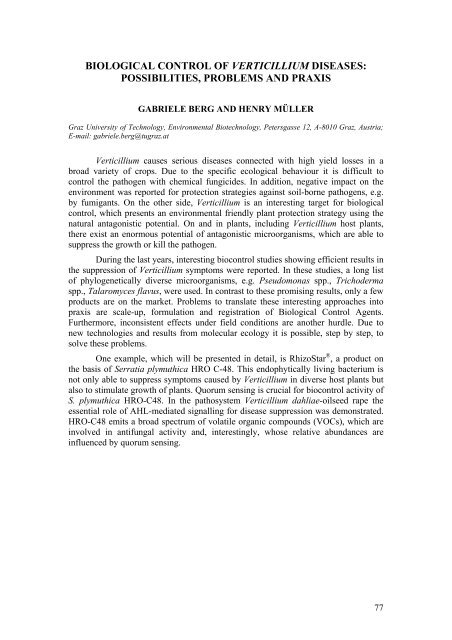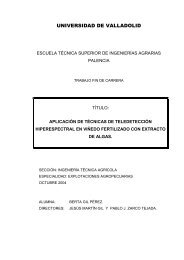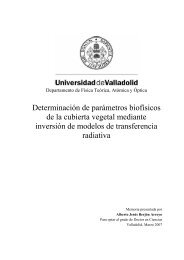10th INTERNATIONAL VERTICILLIUM SYMPOSIUM 16-20 ...
10th INTERNATIONAL VERTICILLIUM SYMPOSIUM 16-20 ...
10th INTERNATIONAL VERTICILLIUM SYMPOSIUM 16-20 ...
Create successful ePaper yourself
Turn your PDF publications into a flip-book with our unique Google optimized e-Paper software.
BIOLOGICAL CONTROL OF <strong>VERTICILLIUM</strong> DISEASES:POSSIBILITIES, PROBLEMS AND PRAXISGABRIELE BERG AND HENRY MÜLLERGraz University of Technology, Environmental Biotechnology, Petersgasse 12, A-8010 Graz, Austria;E-mail: gabriele.berg@tugraz.atVerticillium causes serious diseases connected with high yield losses in abroad variety of crops. Due to the specific ecological behaviour it is difficult tocontrol the pathogen with chemical fungicides. In addition, negative impact on theenvironment was reported for protection strategies against soil-borne pathogens, e.g.by fumigants. On the other side, Verticillium is an interesting target for biologicalcontrol, which presents an environmental friendly plant protection strategy using thenatural antagonistic potential. On and in plants, including Verticillium host plants,there exist an enormous potential of antagonistic microorganisms, which are able tosuppress the growth or kill the pathogen.During the last years, interesting biocontrol studies showing efficient results inthe suppression of Verticillium symptoms were reported. In these studies, a long listof phylogenetically diverse microorganisms, e.g. Pseudomonas spp., Trichodermaspp., Talaromyces flavus, were used. In contrast to these promising results, only a fewproducts are on the market. Problems to translate these interesting approaches intopraxis are scale-up, formulation and registration of Biological Control Agents.Furthermore, inconsistent effects under field conditions are another hurdle. Due tonew technologies and results from molecular ecology it is possible, step by step, tosolve these problems.One example, which will be presented in detail, is RhizoStar ® , a product onthe basis of Serratia plymuthica HRO C-48. This endophytically living bacterium isnot only able to suppress symptoms caused by Verticillium in diverse host plants butalso to stimulate growth of plants. Quorum sensing is crucial for biocontrol activity ofS. plymuthica HRO-C48. In the pathosystem Verticillium dahliae-oilseed rape theessential role of AHL-mediated signalling for disease suppression was demonstrated.HRO-C48 emits a broad spectrum of volatile organic compounds (VOCs), which areinvolved in antifungal activity and, interestingly, whose relative abundances areinfluenced by quorum sensing.77




